-

新人教版高中英语必修3Unit 3 Diverse Cultures-Reading for Writing教学设计
The topic of this part is “Describe a place with distinctive cultural identity”.This section focuses on Chinese culture by introducing Chinatown, whose purpose is to show the relationship between the Chinese culture and American culture. The Chinese culture in Chinatown is an important part of American culture. Chinatown is an important window of spreading Chinese culture and the spirit homeland of oversea Chinese, where foreigners can experience Chinese culture by themselves.Concretely, the title is “Welcome to Chinatown!”, from which we can know that the article aims at introducing Chinatown. The author used the “Introduction--Body Paragraph--Conclusion” to describe the people, language, architecture, business, famous food and drinks and people’s activities, which can be a centre for Chinese culture and shows its unique charm.1. Read quickly to get main idea; read carefully to get the detailed information.2. Learn the characteristics of writing and language.3. Learn to introduce your own town according to the text.4. Learn to correct others’ writing.1. Learn the characteristics of writing and language.2. Learn to introduce your own town according to the text.Step 1 Lead in ---Small talkIn the reading part, we mentioned the Chinatown of San Francisco. How much do you know about Chinatown of San Francisco ?Chinatown is a main living place for Chinese immigrants, where you can see many Chinese-style buildings, costumes, operas, restaurants, music and even hear Chinese.Step 2 Before reading ---Predict the contentWhat is the writer’s purpose of writing this text ? How do you know ?From the title(Welcome to Chinatown) and some key words from the text(tourist, visit, visitors, experience), we can know the purpose of the text is to introduce Chinatown and show the relationship between Chinese culture and American culture.

新人教版高中英语必修3Unit 3 Diverse Cultures-Listening &Speaking&Talking教学设计
1. In Picture 1 and Picture 2, where do you think they are from? How do you know?From their wearings, we can know they are from ethnic minority of China--- Miao and Dong.Picture 1, they are playing their traditional instrument lusheng in their traditional costumes.Picture 2. the girls are Miao because they wear their traditional costumes and silver accessory.2. In Picture 3, can you find which village it is? What time is it in the picture?It is Dong village. It is at night. Step 2 While-listeningJustin met a new friend while traveling in Guizhou. Listen to their conversation and complete the summaries below.Part 1Justin and Wu Yue watched some Miao people play the lusheng. The instrument has a history of over 3,000 years and it is even mentioned in the oldest collection of Chinese poetry. Then they watched the lusheng dance. Justin wanted to buy some hand-made silver/traditional accessories as souvenirs. He was told that the price will depend on the percentage of silver. Part 2They will go to a pretty Dong minority village called Zhaoxing. they will see the drum towers and the wind and rain bridges. They may also see a performance of the Grand Song of the Dong people.Step 3 Post-listening---TalkingWork in groups. Imagine Justin is telling some friends about his trip to Guizhou. One of you is Justin and the rest of you are his friends. Ask Justin questions about his trip and experience. The following expressions may help you.

新人教版高中英语必修3Unit 3 Diverse Cultures-Reading and Thinking教学设计
Discuss these questions in groups.Q1: Have you ever been to a place that has a diverse culture ? What do you think about the culture diversity ?One culturally diverse place that I have been to is Harbin, the capital city of Heilongjiang Province. I went there last year with my family to see the Ice and Snow Festival, and I was amazed at how the culture as different to most other Chinese cities. There is a big Russian influence there, with beautiful Russian architecture and lots of interesting restaurants. I learnt that Harbin is called “the Oriental Moscow” and that many Russians settled there to help build the railway over 100 years ago.Q2: What are the benefits and challenges of cultural diversity ?The benefits: People are able to experience a wide variety of cultures, making their lives more interesting, and it can deepen the feelings for our national culture, it is also helpful for us to learn about other outstanding culture, which helps improve the ability to respect others. The challenges: People may have trouble communicating or understanding each other, and it may lead to disappearance of some civilizations and even make some people think “The western moon is rounder than his own.”Step 7 Post reading---RetellComplete the passage according to the text.Today, I arrived back in San Francisco, and it feels good (1) _____(be) back in the city again. The city succeeded in (2)_________ (rebuild) itself after the earthquake that (3)________ (occur) in 1906, and I stayed in the Mission District, enjoying some delicious noodles mixed with cultures. In the afternoon, I headed to a local museum (4)____ showed the historical changes in California. During the gold rush, many Chinese arrived, and some opened up shops and restaurants in Chinatown to earn a (5)_____ (live). Many others worked on (6)______ (farm), joined the gold rush, or went to build the railway that connected California to the east. The museum showed us (7)____ America was built by immigrants from (8)________ (difference) countries and cultures. In the evening, I went to Chinatown, and ate in a Cantonese restaurant that served food on (9)________(beauty) china plates. Tomorrow evening, I’m going to (10)__ jazz bar in the Richmond District. 答案:1. to be 2. rebuilding 3. occurred 4. that 5.living6. farms 7.how 8. different 9. beautiful 10. a

新人教版高中英语必修3Unit 5 The Value of Money- Discovering Useful Structure教学设计
Step 3 Meaning1. 过去将来时表示从过去某一时间来看将要发生的动作或存在的状态, 常用在宾语从句中。一般由“would/should +动词原形”构成。She hoped that they would meet again someday. 她希望将来有一天他们能再见面。2. was/were going to+动词原形: 表示过去将要发生或很有可能发生的动作, 常用于口语中, 表示预言、意图或者打算等。He was going to start work the following week. 他打算下星期开始工作。3. was/were about to do: 常用来表示即将发生的动作, “刚要/正要做……”。注意该结构不与任何时间状语连用。I felt that something terrible was about to happen. 我感到某种可怕的事情即将发生。4.was/were to do: 表示“曾计划做某事”, 如果表示“本来计划做某事, 动作没实现”, 则需用 “was/were to have done”。She said she was to have told me about the accident. 她说她本来想告诉我关于事故的事。5.Start, go, come, leave, see, meet等动词的过去进行时: 表示就过去某一时刻而言即将发生的动作。She was coming later. 她随后就来。I had just put on my overcoat and was leaving to visit a friend of mine. 我刚穿上外套要去看我的一个朋友。

新人教版高中英语必修3Unit 5 The Value of Money-Listening &Speaking&Talking教学设计
4. A:We’d like to have someone to say a word at the beginning to welcome the group.B:↙Who?A:We thought that you or Dr.Johnson might do it.B用降调说Who,其意思是问,对方想让谁在开场时致欢迎词。Step 6 Pronunciation---Practice1. Listen to the short conversation and mark the intonation with ↗, ↙ or ↙, ↗. Then discuss with a partner what they intend to convey by using different intonation.Owner: You know what ?↗ It’s a million-pound bank note↙.Waiter 1: Really ?↗(question)Waiter 2: Really !↙(unbelievable and surprised)Waiter 3: Really ?!↙↗(first question then surprised)2. Listen to the conversations. Underline the parts that are stressed and mark the intonation. Then talk about the implied meanings of the responses with different intonations. Listen again and repeat.1) Henry: It’s a nice suit.Owner: Oh, it’s perfect!↙(The intonation means it is very suitable for Henry.)2) Henry: Well, that’s very kind of you.Owner: Kind, sir ?↗(what you said is not right) No, it’s kind of you. You must come whenever you want and have whatever you like. Just having you sit here is a great honour !!↙(welcome you to come again)3)Henry:Well, to be honest, I have none. Oliver:(happily) What luck!(excited) Brother↗, what luck!↙(It means “Didn’t you hear it?”)Henry: Well, it may seem lucky to you but not to me!↗(angry) If this is your idea of some kind of joke, I don’t think it’s very funny. Now if you’ll excuse me, I ought to be on my way.↙(If so, I would leave.)Roderick: Please don’t go↙...(hope Henry can wait for a moment)Part B Viewing and Talking---Describe people’s changing attitudes in a film clipStep 1 Before-listening---Tell the filmYou are going to watch part of the film The Million Pound Bank Note. Look at these photos and guess what happens in the film.

新人教版高中英语必修3Unit 5 The Value of Money-Listening &Speaking教学设计
Step 4: Listen again and decide if the following statements are true (T) or false (F).1 It was the first time Chen Liyan's story was reported. T口 F口2 Chen found 10,000 yuan in a small plastic bag in Taiyuan railway station口 F口3 Wang Zheng apologized to Chen because he couldn't offer her more money. T口 F口4 Chen took out a large loan to cure her daughter, T口 F口5 Wang set up a fundraising website for Chen's daughter after Chen told him about her situation. T口 F口Step 5:After listening, discuss the questions.1 What kind of person do you think Chen Liyan is?Chen Liyan is generous and honest because she returned a large sum of money to the owner.2 Did Chen return the money because she didn't need it?No. She returned the money because it was the right thing to do. Evidence for this is that she refused to accept the reward money because she felt that it had not been earned. 3 Is it common for people to do what Chen did?It depends on the culture. In some countries it is quite common to return money that has been found. In other countries, people believe "Finders are keepers!" 4 How did Wang Zheng feel about the return of his money?He must have been very happy and relieved to have gotten his money back. We know this because he thanked Chen repeatedly and even offered her a reward.5 Why did Ma Dongbao tell Wang about Chen's family?He must have had great sympathy for Chen and her daughter and wanted to help them.'We know this because he arranged help for them. 6 How did the news reporter feel about Chen's actions?The news reporter felt that it showed that money wasn't the most important thing in life. We know this because the reporter told us that this is what Chen believes. and then said, “that's a great attitude to take."

新人教版高中英语必修3Unit 5 The value of money-Reading and Thinking教学设计二
? Could you offer me some kind of work here?? I don’t want your charity, I just want an honest job.? Careless: I landed in Britain by accident.Step 7:Consolidation.? Find Henry? Roderick and Oliver were I .making a bet when they saw Henry, a poor young man. ? Know Henry? About a month ago, Henry was sailing and later he found himself carried out to sea by a strong wind. Fortunately, he 2.was spotted by a ship. And it was the ship that brought him to 3.England? Offer money to Henry ? Oliver and Roderick gave Henry a letter and told him that there was money in it. They 4.persuaded him to accept it, and made him 5.promise that it wouldn't be opened until 2 o'clock.Step 8:Language pointsa large amount of: a large quantity of; a great deal ofe.g. They bought a large amount of furniture before they moved their new house.make a bet: make an arrangement to risk money, etc. on an event of which the result is doubtful.e.g. We made a bet on the result of the match.permit sb to do something: allow somebody to do somethinge.g. My mother doesn’t permit me to ride in the street after it rained.by accident: as a result of chancee.g. I only found it by accident.stare at: look at somebody or something with the eyes wide open in a fixed gaze( in astonishment, wonder, fear, etc)to be honest: to tell you the truth; to be franke.g. To be honest, I don’t think we have a chance of winning.Step7 Homework:What do you think will happen to Henry? Will the bank-note help him or get him into trouble?

新人教版高中英语必修3Unit 5 The Value of Money-Reading and Thinking教学设计一
Everybody wants to get wealth.In today’s material world,making money or becoming wealthy symbolizes a person’s success and capability. Many people just make every effort, pay any price to attain greater wealth. With money,they can buy nice, large apartments in nice neighborhood. With money they can own luxurious cars. Wealth seems to bring all happiness in life.But is wealth the only road to happiness? Not really. There are many things in the world, which are beyond the means of money, such as friendship, love, health and knowledge. People are so preoccupied with struggling for money that they have no time or would not take the time to form or maintain friendship. What happiness can they feel living as lonely miserable creatures without love or friends in the world even if they accumulate tremendous wealth?In my opinion, people can’t do anything without money, but money is not everything. What money will bring you depends on your personal belief and goal in life. If you are kind enough to help others, especially the poor, money is a good thing to you. With it, you can do much more for the benefit of people and your country, and it will add to your own happiness. If you want money just for your own needs, you’ll never be satisfied or happy. In a word,you should have money spent for more people. Only then can money be the source of your happiness.Step 8 Homework4 students in a group, one acts Roderick, one Oliver, one servant and the fourth one acts Henry Adams, then listen to the tape, pay more attention to the difference between American English and British English in pronunciation, stress, tone.

新人教版高中英语必修3Unit 5 The Value of Money-Reading for Writing教学设计二
2. 您能看到, 我头发太长了。You can see that my hair is much too long.3. 无论什么时候, 只要您想回来就回来。Please come back whenever you want.4. 您仅有很少的头发要理! You only have too little hair to cut !5. 为您服务是我的荣幸!It is my honour to serve you!Step 9 Writing(Henry is walking down the street when he sees a sign for a place that cuts hair. He decides to have it cut. )H=Henry B=BarberH: Good afternoon, I’d like to have my hair cut, if I may. (The barber looks at Henry’s hair and continues cutting another man’s hair. ) Er, I’d really like a haircut. As you can see it’s much too long. B: (in a rude manner) Yes, I can see that. Indeed, I can. H: Fine, well, I’ll have a seat then. (He sits in one of the barber’s chairs. The barber turns to look at Henry. )B: It’s quite expensive here, you know! Are you sure you can afford it?H: Yes. I think so. (After his hair is cut, the barber tells Henry how much he must pay. Henry shows the barber the bank note. )B: Why Mr. . . (looks shocked)H: Adams. Henry Adams. I’m sorry. I don’t have any change. B: Please don’t worry! (wearing a big smile) Nothing to worry about! Nothing at all! Please come back whenever you want, even if you only have too little hair to cut! It will be my honour to serve you!Step 10 Pair workExchange drafts with a partner. Use this checklist to help your partner revise his/her draft.1. Are all the elements of a play included and in good order ?2. Do the character use suitable language ?3. Are the stage directions clear and useful ?4. Is the plot clear and exciting enough ?

新人教版高中英语必修3Unit 5 the value of money-Reading For Writing教学设计一
【参考范文】Narrator:(Henry is smiling as he leaves the restaurant. As he is walking down the street, he sees a sign for a place that cuts hair. He decides to get it cut. )H=Henry;B=Barber;R=rude manH:Good afternoon, I'd like to get a cut, if I may. (The barber looks at Henry's hair and continues cutting another man's hair. )Er, I'd really like a haircut. As you can see it's much too long. B:(in a rude manner) Yes, I can see that. Indeed, I can. H:Fine, well I'll have a seat then. (He sits in one of the barber's chairs. The barber turns to look at Henry. )B:It's quite expensive here, you know!Are you sure you can afford it?H:Yes. I think so. (In comes the rude man. )R:Hey you there. I need a haircut quickly. Can you do me straightaway?B:All right, then, get in the chair and I'll see what I can do. R:Thank you. (sits down in one of the barber's chairs)H:Excuse me, but I was here first. Aren't you going to do my hair first?B:This man's in a hurry. H:Well so am I!I insist that you cut my hair first. B:OK, but I'll have to be quick. This gentleman is waiting. H:Thank you. (They both become quiet. After his hair is cut, the barber tells Henry how much he must pay. Henry shows the barber the bank note. )B:Why, Mr . . . (looks shocked)H:Adams. Henry Adams. I'm sorry, I don't have any change. R:You're that Mr Adams! Well,I'm glad I waited or I might never have known it was you. B:Why, Mr Adams, please don't worry!(wearing a big smile) Nothing to worry about!Nothing at all!Please come back any time, even if you only need too little hairs cut!It will be my honour to serve you!

新人教版高中英语必修3Unit 1 Festivals and Celebrations-Reading for writing教学设计二
Step 3 Analyzing article structureActivity 31. Teachers raise questions to guide students to analyze the chapter structure of this diary and think about how to describe the festival experience. (1)What should be included in the opening/body/closing paragraph(s)?(2)How did the writer arrange his/her ideas?(3)What kind of interesting details did the writer describe?(4)How did the writer describe his/her feelings/emotions during the event?2. Students read and compare the three sentence patterns in activity 2. Try to rewrite the first paragraph of the diary with these three sentence patterns. After that, students exchange corrections with their partners. Such as:●This was my first time spending three days experiencing the Naadam Festival in China’s Inner Mongolia Autonomous Region and it was an enjoyable and exciting experience. ●I'll never forget my experience at the Naadam Festival because it was my first time to watch the exciting Mongolian games of horse racing, wrestling, and archery so closely. ●I'll always remember my first experience at the Naadam Festival in China’s Inner Mongolia Autonomous Region because it was so amazing to spend three days witnessing a grand Mongolian ceremony. Step 4 Accumulation of statementsActivity 41. Ask the students to read the diary again. Look for sentences that express feelings and emotions, especially those with the -ing form and the past participle. Such as:● …horse racing, wrestling, and archery, which are all so exciting to watch. ● some amazing performances● I was surprised to see…● I was a little worried about. . . ● feeling really tiredOther emotional statements:●I absolutely enjoyed the archery, too, but the horse races were my favourite part. ●I'm finally back home now, feeling really tired, but celebrating Naadam with my friend was totally worth it. ●He invited me back for the winter to stay in a traditional Mongolian tent and cat hot pot. I can’t wait!2. In addition to the use of the -ing form and the past participle, the teacher should guide the students in the appreciation of these statements, ask them to memorize them, and encourage them to use them reasonably in writing practice.
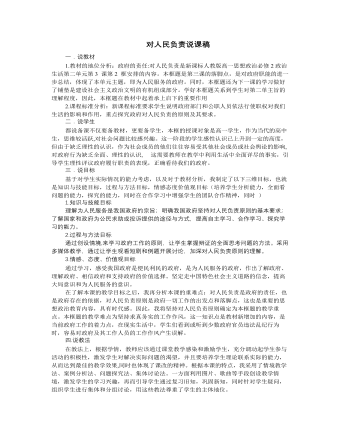
人教版高中政治必修2对人民负责说课稿
在学生活动的基础上,教师总结归纳:要坚持从群众中来到群众中去的工作方法。要求:政府要通过各种途径,利用各种群众组织、社会团体广泛收集群众意见和建议,认真对待群众的来信来访。还要为群众诚心诚意办实事,尽心竭力解难事,坚持不懈。通过合作探究,以此来培养学生的分析能力,探究能力以及透过现象看本质的能力,培养学生获取信息的能力,自主学习的能力以及全面看问题的能力,再结合教师的讲授,给学生一种茅塞顿开的感觉。环节四 回归生活 提升情感我将引导学生阅读课本,通过设置活动探究课,结合生活实际从时效,便利,实效等方面请学生评述公民求助或投诉的四种方式的特点和优点。在这一过程中,我还会用多媒体展示常用的热线电话,政府网站上有关信访、政务公开及其他便民利民的栏目,丰富课堂资源。让学生阅读课本,自行归纳知识点,有助于培养学生自主学习能力。
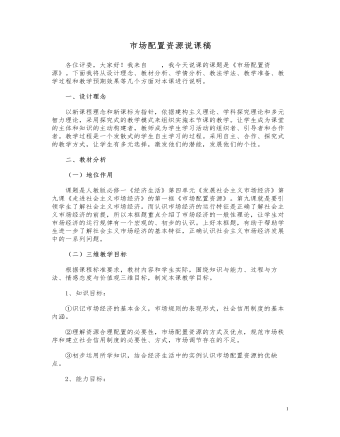
人教版高中政治必修1市场配置资源说课稿
(2)、市场调节存在固有的弊端:自发性:由于市场调节是在价值规律自发作用下进行的,在利益驱动下会产生一些违反市场原则的行为,如制造、销售假冒伪劣商品,大量排放废水、废气破坏环境,窃取他人智力成果等等。盲目性:由于人们不可能完全掌握生产各方面信息及其变化趋势,致使决策带有一定的盲目性。如某种商品有利可图则一哄而上,反之则一哄而退,从而造成资源浪费和消费得不到充分满足。滞后性:由于市场价格的形成和传递有一个过程,一旦传递到生产经营者手中进行生产调整,就有一个时间差,致使市场调节带有滞后性,成为一种事后调节。教师活动:请同学们想一想,市场的这些弊端和不足,会导致什么后果?(3)、危害教师总结:资源浪费,经济波动与混乱,分配不公两极分化等。设计意图:通过创设情景,加深对市场调节局限性的理解;要求学生结合生活实例探讨其弊端有助于加强对其产生原因和表现的记忆和理解。
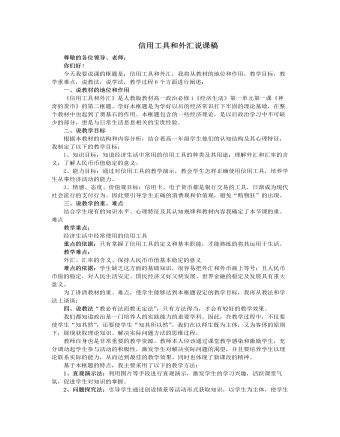
人教版高中政治必修1信用工具和外汇说课稿
一、对教材内容的处理根据新课程标准的要求、知识的跨度、学生的认知水平,我对教材内容有增有减。二、教学策略的选用(一)运用了模拟活动,强化学生的生活体验,本框题知识所对应的经济现象,学生已具有了一定的生活体验,但是缺乏对这种体验的深入思考。因此在进一步强化这种体验的过程中进行了思考和认知,使知识从学生的生活体验中来,从学生的思考探究中来,有助于提高学生的兴趣,有助于充分调动学生现有的知识,培养学生的各种能力,也有助于实现理论知识与实际生活的交融。(二)组织学生探究知识并形成新的知识我从学生的生活体验入手,运用案例等形式创设情境呈现问题,使学生在自主探索、合作交流的过程中,发现问题、分析问题、解决问题,在问题的分析与解决中主动构建知识。也正是由于这些认识来自于学生自身的体验,因此学生不仅“懂”了,而且“信”了。从内心上认同这些观点,进而能够主动地内化为自己的情感、态度、价值观,并融入到实践活动中去,有助于实现知、行、信的统一。
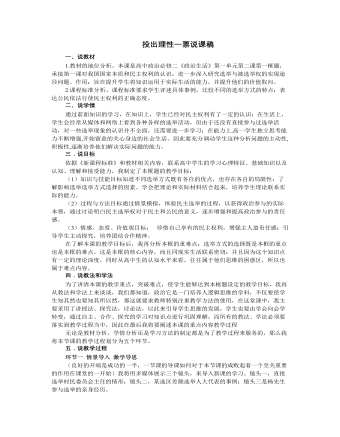
人教版高中政治必修2投出理性一票说课稿
环节三情景模拟 情感升华首先:1、本课开始观看的视频中:选出村长体现了村民参加选举的什么态度?生活中一些人“多我一票不多,少我一票不少,选举与我无关"的想法2、你如何看待上述两种不同态度?为什么?发表你的看法【教师这个过程中点拨、引导】如果我们都不珍惜自己的选举权,那么我们的国家将会出现什么后果?3、那么作为将来选民和被选举人,你们认为应具有那些政治素养才能适应?学生结合教材思考(1)(提示)不行使或不认真行使自己的选举权,意味着我们将不能选举出能为人民谋福利的当家人,意味着我们的国家将由重蹈旧中国的覆辙。(2)从态度上讲:公民应积极参加选举,认真行使这一权利,不断增强公民意识和主人翁意识,增强公民的参与感和责任感。(3)从能力上讲:要不断提高公民的政治参与能力(政治素质、文化素质、议政能力),在周全考虑、理性判断的基础上,郑重地投出自己的一票。
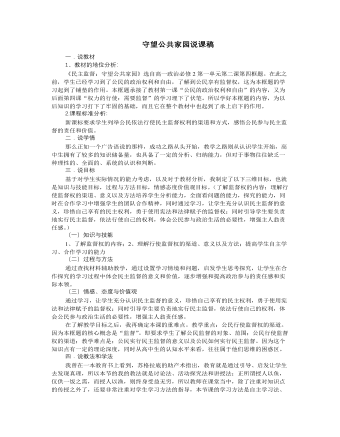
人教版高中政治必修2守望公共家园说课稿
环节四 课堂小结 巩固知识本节课我采用线索性的板书,整个知识结构一目了然,为了充分发挥学生在课堂的主体地位,我将课堂小结交由学生完成,请学生根据课堂学习的内容,结合我的板书设计来进行小结,以此来帮助教师在第一时间掌握学生学习信息的反馈,同时培养学生归纳分析能力、概括能力。环节五 情景回归,情感升华我的实习指导老师告诉过我们,政治这一门学科要从生活中来到生活去,所以在课堂的最后让学生考察自己所在社区存在的问题,然后制定监督方案,以此培养学生对理论的实际运用能力,同时检验他们对知识的真正掌握情况,以此达到情感的升华,本节课,我根据建构主义理论,强调学生是学习的中心,学生是知识意义的主动建构者,是信息加工的主体,要强调学生在课堂中的参与性、以及探究性,不仅让他们懂得知识,更让他们相信知识,并且将知识融入到实践当中去,最终达到知、情、意、行的统一。
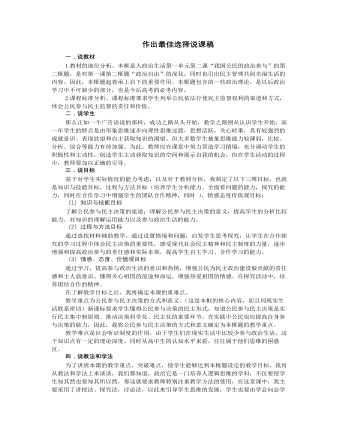
人教版高中政治必修2作出最佳选择说课稿
环节四 模拟演练 情感升华我将让同学们阅读课本22页的材料,并按照所提供的步骤,组织学生举办一次模拟听证会,将学生分为四个小组,分别扮演教育局工作人员、人大代表、学生家长、学校校长的角色。待学生们模拟听证会结束后,我将采访学生,让他们谈谈参加完听证会后的感受,从而利用角色感悟总结落实民主决策的重大意义。这样,学生们在模拟演练中,感悟公民要通过各种渠道参与民主决策,是推进决策科学化、民主化的重要环节。为学生将来参与政治生活积累经验,增强了学生的主人翁意识和社会责任感。环节五 课堂小结 课后延伸我将用多媒体展示本节课的知识框架,并注重引导学生将今天所学新知识与前面知识联系起来,帮助学生从宏观上把握各知识点之间的关系,有利于学生理解记忆。另外,适当的课堂练习能检验学生掌握知识的情况,因此,课堂小结后我将让学生做一些典型的练习,加深学生对本课知识的理解,同时为为下一课的学习做准备。
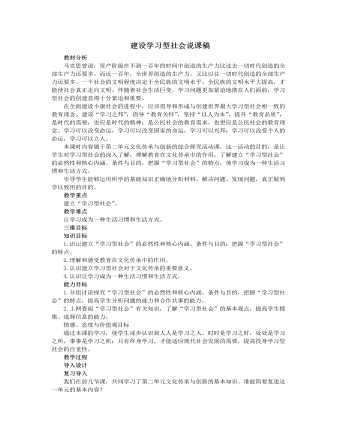
人教版高中政治必修3建设学习型社会说课稿
解析:材料是讲学习型社会所产生的影响,A项观点错误,在当前和今后相当长的时间里,学校教育仍然是人们获得知识的最重要的途径。B项观点错误,终身学习只是成就人生目的的手段、途径,而不是目的本身。D项说法错误,当前我国社会的中心工作是经济建设。二、问答题5.材料一:日本是公认的漫画大国,日本的动漫产业产值每年230万亿日元,成为日本的第二大支柱产业。在日本,漫画比电影、小说有时甚至比电视或音乐更受欢迎。日本漫画的热潮还席卷了世界:日本每年出口到美国的卡通片价值就达5 000亿日元,是日本对美国钢铁出口金额的4倍;漫画中的人物被迅速复制成电子游戏、卡通片及真人演出的节目。原来只是闲暇时候消遣的漫画,正飞速渗透到人们的生活中。值得警惕的是,除了催人奋进的精华之外,日本漫画中也存在暴力、色情、扭曲历史等诸多糟粕,对缺乏辨别能力的青少年产生了许多不良影响,更引发了一系列深刻的社会问题。
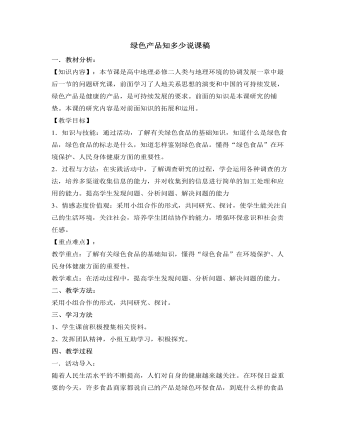
人教版高中地理必修2绿色产品知多少说课稿
各小组派代表汇报。4、教师提出问题组织学生讨论:⑴要想了解更多的绿色食品,了解绿色食品的销售情况,我们应该怎么做?⑵要想了解广大消费者对绿色食品的态度,食用绿色食品的意义,是否懂得辨认绿色食品,以及什么样的人群对此知识最缺乏等,我们应该怎么做?组织学生汇报交流。5、做个“绿色食品”广告设计师。为你喜欢的绿色食品设计广告语,每组推荐一个。6、让学生了解绿色食品认证程序。7、绿色食品打“假”队员在行动。8、向学生介绍生态绿色食品基地。三、活动总结:通过研究、探讨,了解学生对绿色食品的态度。提问:民以食为天,吃,是一个大问题,如果你的爸爸妈妈让你到超市买牛奶、方便面等,你会选择什么样的食品?为什么?希望通过今天的学习,同学们能够做到绿色消费,也希望你们向自己的家人、向周围的了解学生对“无公害食品”、“有机食品”与“绿色食品”的认识。
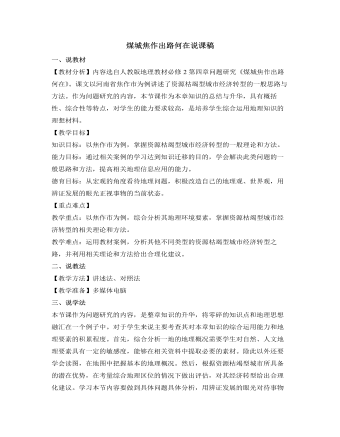
人教版高中地理必修2煤城焦作出路何在说课稿
分析过焦作市的地理概况和产业优势后,就需要针对由于资源枯竭所带来的问题提出合理化的建议。既然是谈经济转型,就应该将话题的范围明确在这一领域内。通过材料3的相关内容,我们了解到焦作市需要在产业结构调整、培育新的优势产业、增强综合竞争力等三个整改方针上下功夫。因而引导学生针对优势与不足提出建议,以三个整改方针为基准,衡量建议的可行性是锻炼学生解决此类问题的有效途径。在此我将教会学生的是解决问题方法而非案例的内容,正所谓“授之以鱼,不如授之以渔”。接下来针对学生的建议和教材资料分析所罗列的10点整改思路,由学生自由发言提出看法,通过教师的指导和学生的讨论,进而确定经济转型建议的具体方案。最后注意将建议与产业优势相对照,看建议是否都是围绕着产业优势而提出的,这样做会加深学生的印象,通过建议和优势的对应关系,将不难找出此类问题的解题思路。

